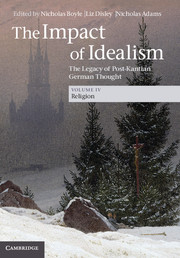Book contents
- Frontmatter
- Contents
- List of Contributors
- Acknowledgements
- List of Abbreviations
- Introduction: the impact of Idealism on religion
- 1 The impact of Idealism on Christology: from Hegel to Tillich
- 2 German Idealism's Trinitarian legacy: the nineteenth century
- 3 German Idealism's Trinitarian legacy: the twentieth century
- 4 Kierkegaard, Hegelianism and the theology of the paradox
- 5 Biblical hermeneutics: from Kant to Gadamer
- 6 Aesthetic Idealism and its relation to theological formation: reception and critique
- 7 The autonomy of theology and the impact of Idealism: from Hegel to radical orthodoxy
- 8 Faith and reason
- 9 Rabbinic Idealism and Kabbalistic realism: Jewish dimensions of Idealism and Idealist dimensions of Judaism
- 10 ‘In the arms of gods’: Schelling, Hegel and the problem of mythology
- 11 Dialectic and analogy: a theological legacy
- Bibliography
- Index
- References
11 - Dialectic and analogy: a theological legacy
Published online by Cambridge University Press: 05 December 2013
- Frontmatter
- Contents
- List of Contributors
- Acknowledgements
- List of Abbreviations
- Introduction: the impact of Idealism on religion
- 1 The impact of Idealism on Christology: from Hegel to Tillich
- 2 German Idealism's Trinitarian legacy: the nineteenth century
- 3 German Idealism's Trinitarian legacy: the twentieth century
- 4 Kierkegaard, Hegelianism and the theology of the paradox
- 5 Biblical hermeneutics: from Kant to Gadamer
- 6 Aesthetic Idealism and its relation to theological formation: reception and critique
- 7 The autonomy of theology and the impact of Idealism: from Hegel to radical orthodoxy
- 8 Faith and reason
- 9 Rabbinic Idealism and Kabbalistic realism: Jewish dimensions of Idealism and Idealist dimensions of Judaism
- 10 ‘In the arms of gods’: Schelling, Hegel and the problem of mythology
- 11 Dialectic and analogy: a theological legacy
- Bibliography
- Index
- References
Summary
In his splendidly magisterial and opinionated lectures on Protestant Theology in the Nineteenth Century, Karl Barth picks up a throwaway parenthesis by Novalis on the concept of God:
Gott ist bald 1 × ∞ − bald 1/∞ − bald 0.
This gnomic formula is then used by Barth as the springboard for an eloquent reflection on the essence of the Romantic dilemma about the sacred: to say that God is the infinite multiplication or the infinite division of a ‘given quality of the ego or of life’ is to posit a divinity that is ultimately defined as a function of some pre-existing constant – infinite, we might say, but not finally different; but the characteristically Romantic sensibility constantly moves in the direction of an other not determined by the ego, an other that is the condition of possibility for the union of subject and object. So the divine may be figured as the ‘infinitisation’ of the ego's play, the ego's dance, the indefinite variety of the constant ego's relations to infinity; but this cannot be all. What then might it mean to say that God is ‘sometimes nought’? For Barth this is where we see a recognition of the irruption of an incalculable otherness into what had been merely a world of the immediate constant and a background indefiniteness – a recognition of the inescapable death of the ego. ‘For 0 is certainly not merely a harmless little point which is passed through between +1 and −1’: the God who is ‘sometimes 0’ is irreducibly opposed to the given life or ego presupposed in the first part of the formulation: this is a God who makes the entire dance of the ego either possible or impossible. And so the God who is an infinitising of something given and the God who both negates and affirms the entire system cannot be ‘God’ in the same sense.
- Type
- Chapter
- Information
- The Impact of IdealismThe Legacy of Post-Kantian German Thought, pp. 274 - 292Publisher: Cambridge University PressPrint publication year: 2013
References
- 1
- Cited by



